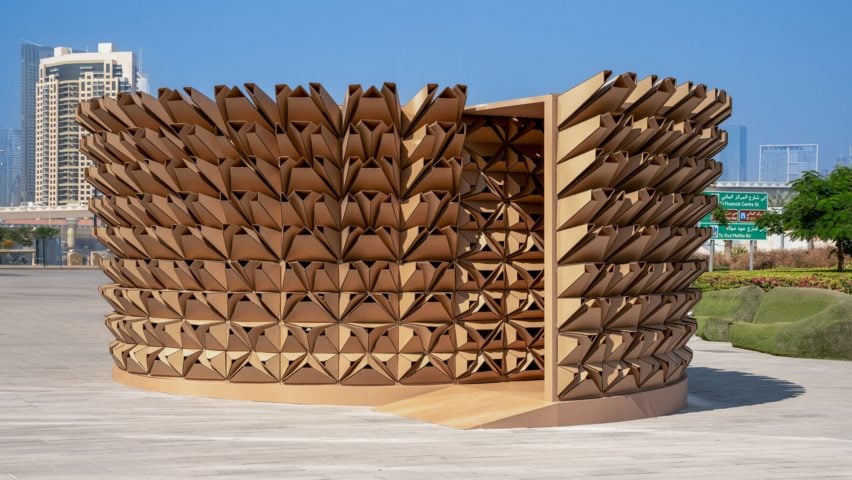As part of Dubai Design Week, British designer Ross Lovegrove has unveiled the first completed project from Deond, the design practice he founded with creative director Ila Colombo after moving to the United Arab Emirates.
The Enfold pavilion is clad in 945 sheets of recycled cardboard, hand-folded into trapezoidal modules that overlap across its circular timber frame.
Modelled on the spiky exterior of a palm tree trunk, the modules were designed using parametric software and configured to let sunlight punctuate the interior via triangular openings.
"The entire architecture was studied in a way to optimize the play of daylight, so during the day it changes," Colombo told Dezeen.
"It responds to the context," Lovegrove added. "You couldn't put this in the East End of London because there's no light and it's going to get wet."
The couple founded Deond after moving to Dubai in 2023 and have since brought on board a "multi-ethnic, cross-disciplinary team" of nine people, with a special focus on talent from Middle Eastern countries including Iran, Lebanon, Egypt, Jordan and Qatar.
The aim is to combine Colombo's background in artificial intelligence and Lovegrove's industrial design expertise – honed through collaborations with brands from Vitra and Knoll to Renault and Moroso – with the distinctive knowledge and sensibilities brought by local designers.
"I'm just kind of cherry-picking people from different countries and trying to bring them together," Lovegrove said.
"Deond gives them an envelope that is not the Ross Lovegrove show, which is very important I think, so they feel that they can grow within a new studio situation."
"We see a lot of design imported to the UAE and I just think it's not the best approach," Colombo added.
"For us, the importance of the practice is to bring a different perspective and offer something that feels more contextualised and locally truthful to here."
The Enfold pavilion, for example, was designed using parametric design software but based on the principle of biomimicry, emulating native flora like palm trees.
The rough exterior gives way to a smooth, monochrome interior, punctuated by the triangular patches of light cast into the interior via the cardboard modules.
Suspended from transparent wires at the centre of the pavilion are sections of a bodysuit Deond is developing, with embellishments added by a 3D printer in a novel method developed by additive manufacturing company Stratasys.
"The whole structure mimics precious fruits that have a very rough exterior but holds something precious inside," said Deond's computational architect Rowan Elselmy.
"It's a blend of nature, biomimicry and technology, which is basically what we're doing at Deond."
Although the design was created digitally, it was assembled by hand with Colombo and Elselmy folding the modules by hand over the course of three days using 945 sheets of corrugated cardboard sourced from a local packaging manufacturer.
The hope is for Deond to go beyond product or installation design to create more large-scale projects and the studio is currently in talks to work on an architecture project in Saudi Arabia and on transport in the UAE.
"We moved here because the UAE is interested in everything that's new: AI, drones, new ways of building, 3D printing, all these things," Lovegrove said.
"They have the money, they have the energy but they also have the mindset because they're young. There's no real historical baggage."
Elsewhere at Dubai Design Week, the designer is presenting a range of intricate 3D-printed door handles, created in collaboration with Portuguese manufacturer JNF.
Lovegrove isn't the first well-known British designer to move to Asia in recent years with the aim of realising more future-facing projects.
After stepping down from PriestmanGoode in 2022, Paul Priestman emigrated to Shanghai to set up his new studio PULI Innovation because "things happen so much more quickly" in China.
"I do think this is becoming the centre of creativity and innovation," he told Dezeen.
The photography is by Deed.
Dezeen is a media partner of Dubai Design Week 2024, which takes place from 5 to 10 November. See Dezeen Events Guide for an up-to-date list of architecture and design events taking place around the world.

